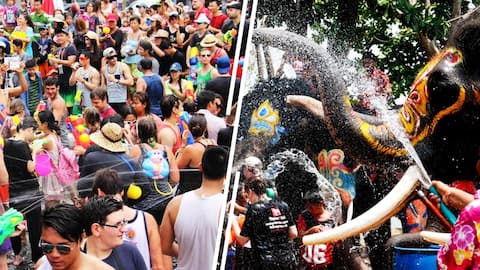Countdown to Songkran: Thailand's festive heritage
What's the story
The Songkran festival, celebrated between April 13th and 15th annually, holds a place of utmost joy and anticipation among Thais. Marking the traditional Thai New Year, it is hailed for its grace and exuberance. Recently honored with the United Nations Educational, Scientific and Cultural Organization's (UNESCO) prestigious status as an "Intangible Cultural Heritage of Humanity," Songkran symbolizes renewal and unity within Thai society.
Holi allure
Greatest water fighting event
Similar to Holi, Songkran unites communities and draws numerous Indian travelers enticed by its familiar allure. While Holi uses colors, Songkran celebrates with water, symbolizing purification and rejuvenation through the act of splashing. This unique tradition serves as a major attraction for global travelers, who flock to Thailand to participate in the "the greatest water fighting event on the planet!"
Festivities
Tradition, symbolism, and celebration
The UNESCO inscription underscores the profound symbolism of pouring water during Songkran, representing purification, reverence, and the imparting of blessings. Festivities include bathing sacred Buddha images, water splashing among loved ones, traditional games, music, and communal feasts. Families offer food and floral tributes at temples, praying for the elder's well-being, while community gatherings, lively parades, and cultural showcases further enrich the celebration.
Water activities
Maha Songkran Parade
One of the festival's highlights is the Maha Songkran Parade, scheduled for April 11. The procession will feature 20 grand parades and over 1,000 performers. Visitors can enjoy cultural and musical performances, including the renowned Khon masked drama. Exciting water activities, including splashing, take place in a designated water zone equipped with a musical dancing fountain, water tunnel, gigantic wading pool, and water station.
Blessings
Rot Nam Dam Hua
On April 13, the first day of the new year, people, especially the elderly, participate in the Song Nam Phra ritual by visiting temples to sprinkle water on Buddha images. However, regional variations exist. On April 14, another tradition known as Rot Nam Dam Hua involves pouring water mixed with perfume and flowers onto the hands of the elderly, who then bless their lineage.
Do's
Safety precautions
Consider wearing goggles or large glasses to avoid eye irritation from potentially unclean water during Songkran festivities. Stay hydrated, wear a hat, and apply sunscreen to combat the hot summer temperatures. Carry a towel and a change of clothes in a dry bag for post splashing comfort. Participants often end up wet with white powder on their faces, creating a messy but enjoyable experience.
